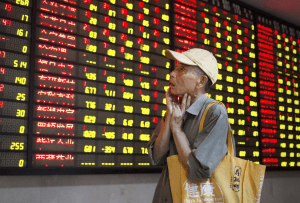Panic Selling Grips Chinese Stocks In Biggest Plunge Since 2008
Mar 14, 2022

Chinese equities traded in Hong Kong saw their weakest day since the global economic crisis in 2008, as panic selling was triggered by fears regarding Beijing's tight connection with Russia and rising regulatory threats.
On Monday, the Hang Seng China Enterprises Index fell 7.2%, the most since November 2008. The Hang Sang Technology Index fell 11%, the biggest drop since the index's inception in July 2020, wiping off $2.1 trillion in value from a year-ago high.
The large fall comes in response to a report by US sources that Russia has requested military aid from China for its campaign in Ukraine. Despite China's denial of the claim, investors fear that Beijing's possible outreach to Vladimir Putin might spark a worldwide reaction against Chinese enterprises, leading to possible sanctions. Confidence was also harmed by a COVID19-induced shutdown in Shenzhen, a critical technology center, and the northern province of Jilin.
This comes on the heels of a wave of regulatory concerns. Tencent Holdings Ltd. is allegedly facing potential unprecedented penalties for violating anti-money laundering regulations, prompting a roughly 10% drop in the company's shares on Monday. Additionally, there is a possibility that Chinese corporations may be delisted from the United States, as the Securities and Exchange Commission has identified many firms as part of an assault on foreign corporations that refuse to reveal their books to US authorities.
"If the United States chooses to put sanctions on China as a whole or on specific Chinese firms doing business with Russia, that would be concerning," warned Mark Mobius, who founded Mobius Capital Partners after spending more than three decades at Franklin Templeton Investments. "In this situation, the whole narrative is still up in the air."
Shareholders have cause to be nervous after the announcement of huge losses tied to Russia by many large-name firms. Since the conflict started, BlackRock Inc.'s assets exposed to Russia have fallen by $17 billion.
On Friday, the Golden Dragon Index, which monitors Chinese corporations' American depository receipts, fell 10% for the second straight day – something it has never experienced in its 22-year lifetime. It plunged up to 13% Monday, after the largest weekly fall since at least 2001. On Monday, China's benchmark CSI 300 Index fell 3.1%. Additionally, the onshore yuan sank to its lowest level in a month as investor confidence about Chinese assets deteriorated.
"In the near term, we don't see any massive catalysts that could support Chinese assets, although quarterly reports may cause some equity price movements," noted Marvin Chen, a Bloomberg Intelligence analyst. "For a meaningful improvement in China's technology sector, we may need to witness a change in regulatory approach, which the just finished NPC conference did not provide."
Even in the midst of the sell-off, mainland traders have kept buying Hong Kong equities, though their acquisitions are not enough to support share prices. Since Feb. 22, they have been net purchasing Hong Kong shares through the stock connect, amassing $1 billion on Monday, the biggest since January.
China Bulls
The unprecedented decline in technology shares is confusing China bulls, the number of whom has increased this year as analysts bet on a comeback in response to the People's Bank of China's policy softening.
Goldman Sachs Group Inc. analysts reduced their enthusiasm for China equities, lowering their MSCI China Index value forecasts.
"We maintain an overweight position in China due to its well-anchored growth expectations/targets, easing policy, depressed valuations/sentiment, and low investor positioning, but reduce our 12-month valuation target from 14.5 to 12 due to shifts in the global microeconomic climate and increased geopolitical tensions," analysts including Kinger Lau stated in a note on Monday.
The MSCI China Index's value has more than halved from its February 2021 high. The index is now trading at around 9 times 12-month forward profits projections, compared to a five-year average of 12.6.
"While the value is attractive, if you are desperate to close your positions, valuation doesn't matter," explained Yasutada Suzuki, Sumitomo Mitsui Bank's head of developing market investments.




